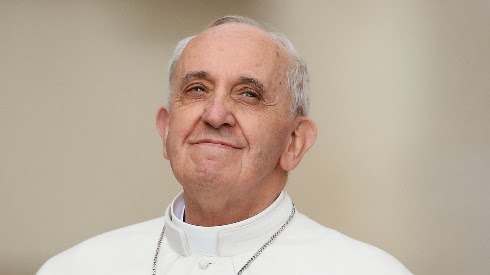We notice it happening more and more among Protestants. “Discernment” is being redefined.
Often, those with the most nuance, vagueness and whimsy in the public statements are considered “discerning” because they know what to say and how to say it in order to receive the acclaim of men or cause the least controversy possible. Biblical discernment is the opposite, however; discernment is to make judgments between right and wrong and to do so based upon the objective Scripture rather than subjective appearances (for more explanation of Biblical discernment, click here).
The Bishop of Rome, also known as the Pope (or Antichrist, depending upon your Confession of Faith), similarly seems to have redefined discernment. For him – like for so many evangelicals – discernment is not being clear on important Biblical issues.
Pope Francis – a committed Marxist and globalist – has departed from the “moral orthodoxy” of the Roman Catholic Church by speaking in unprecedented terms of homosexuality and applied an assumed Universalism towards virtually every class of unrepentant sinner. In short, this leftist Pope has moved hard left at breakneck speed. It would only make sense that Pope Francis would desire to redefine “discernment,” something sorely needed by Papists – some of whom might disagree with his hard left-turn even though they agree with him on superstition and idolatry. The redefinition of discernment has been a goal of the Pope for some time, having used the word, “discernment,” over 30 times in his 2016 Amoris Laetitia. His usage of the term in this papal declaration was designed to allow divorced couples receive communion (a startling departure from Romish teaching), saying, “discernment must help to find possible ways of responding to God and growing in the midst of limits.”
Anyone familiar with Biblical discernment would understand that using discernment for the sake of doctrinal compromise (this is how a traditional Romanist might view it) is hardly the proper use of the term. Demonstrating that the infallible Popes often disagree, Francis has heralded the work of German theologian, Bernard Häring (who was a dissenter of Paul John Paul VI) because Häring argued discernment required not making hard moral stands. Defending his dissent from Pope John Paul VI, Francis was quoted in La Civilta Cattolica as saying…
“Discernment is the key element: the capacity for discernment. I note the absence of discernment in the formation of priests. We run the risk of getting used to ‘white or black,’ to that which is legal. We are rather closed, in general, to discernment. One thing is clear: today, in a certain number of seminaries, a rigidity that is far from a discernment of situations has been introduced. And that is dangerous, because it can lead us to a conception of morality that has a casuistic sense…”
Discernment, to the Pope, has always been not being “rigid” on…you know…Bible-related stuff. This is, of course, the opposite of Biblical discernment as taught in the Scripture. Leave it to the Antichrist to twist the Scripture.
In an interview in Katolikus Valasz, the Pope spoke of discernment again…
“Discernment does not decide what is right or wrong but leads the person to inform himself as fully as possible, so that he can make a right judgment in a particular matter, that is, so that he can act in accord with the truth which God has written upon his heart or conscience.”
Notice the subtle deception. Discernment is not judging between “right and wrong” from the Bible, but allowing someone to make a judgment based upon one’s own conscience.
Most recently, Francis told a group of recently graduated bishops, “[We must not be] imprisoned by nostalgia for being able to give just one answer to apply in all cases,” and that discernment is an “antidote against rigidity, because the same solutions aren’t valid everywhere.”
The Pope of Rome and evangelicals are growingly accepting the same definition of discernment.
HT LifeSite News











